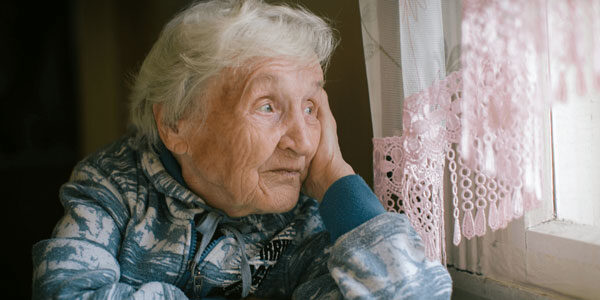While not uncommon, caregivers are often caught off-guard when their loved one with dementia experiences delusions. The Bristal’s team of memory care experts shares practical tips to help caregivers cope with delusions, paranoia, and hallucinations. The Bristal offers specialized memory care for seniors living with Alzheimer’s disease and other types of dementia in communities throughout the tri-state area.
You’ve been helping Dad with his bills and investments for years — and now he’s suddenly convinced you’re trying to steal his money.
Or you’ve shared a happy marriage for decades with your beloved wife, but now, out of the blue, she’s accusing you of having an affair.
These are disturbing and, unfortunately, familiar scenarios for many who care for loved ones with Alzheimer’s disease or another form of dementia. It’s not uncommon for people with dementia to exhibit paranoid or delusional thinking or, in some cases, to experience hallucinations.
Approximately 44 percent of people with dementia may develop delusions at some stage of the disease. The number may be even higher among certain groups.
When paranoia, delusions, or hallucinations occur, it can be traumatic for caregivers. These behaviors are not only difficult to handle at a practical level, but they can be very hurtful at an emotional level.
Knowledge combined with positive coping strategies can help you effectively manage your loved one’s behaviors.
The Differences Among Delusions, Hallucinations, and Paranoia
Delusions
Delusions are firmly held beliefs that are not real. Dementia can also trigger paranoid delusions — Mom may believe someone is poisoning her food, or Dad may think someone is stealing his money. No amount of arguing or reasoning helps.
Hallucinations
A hallucination is different from a delusion. Delusions involve false beliefs, but hallucinations involve false perceptions of objects or events. When someone has a hallucination, they may hear, see, smell, taste, or even feel something that isn’t really there. Hallucinations are less common but can affect people with some types of dementia.
Paranoia
Paranoia is an unrealistic concern that others are “out to get” the person or will harm them. The person with dementia, for example, may become convinced that the police are following him.
Related: Memory loss: What’s normal and what’s not? >>
Paranoia, delusions, and occasionally hallucinations tend to occur in mid-to late-stage dementia. Confusion and memory loss can contribute to these problems as the person struggles to make sense of their world.
For example, if Mom can’t remember leaving her purse in the closet, she may accuse a family member or caregiver of stealing it. If your husband doesn’t recognize a common caregiver or visitor, he may believe there’s a dangerous stranger in the house.
While these accusations can be hurtful, remember that dementia is causing these behaviors. Try not to take it personally. Keep in mind, too, that these situations seem very real for the person with dementia, even though they aren’t grounded in reality.
When to Ask the Doctor About Dementia Delusions
In rare cases, paranoia, delusions, or hallucinations may have a cause that is reversible or treatable. Consider the possibility that the person may be experiencing delirium — a change in attention, awareness, or cognition that may persist for days or weeks.
Some medications can cause delusions or hallucinations as well. Drug interactions — or too much or too little of certain medications — can also affect a person’s mental and emotional stability.
If your loved one’s paranoia, delusions, or hallucinations are new or change in severity, discuss these possibilities with your loved one’s doctor.
Additionally, consult a physician if you believe delusions could lead your loved one to harm themselves or a caregiver. While the first line of treatment is typically through nondrug approaches, medications may be appropriate in severe cases.
Related: Delirium isn’t always related to dementia. Here’s why >>
Tips for Coping with Dementia Delusions
First, try not to let your loved one’s suspicions bother you. And be sure to explain what’s happening to family, friends, and caregivers. Help them understand that suspicions and false accusations are not a reflection of them.
Second, try to maintain your loved one’s daily routine as much as possible. A predictable, consistent schedule will reassure the person and may help reduce anxiety.
Other tips for caregivers
1. Don’t argue or try to convince. Allow the person to express their ideas and acknowledge opinions. Offer reassurance and a gentle touch. Remain calm.
2. Create a calm environment. What may seem like innocent “background noise” from a TV or radio can provoke fear or confusion for your loved one. Remember that the line between reality and fantasy is often blurred in people with dementia.
3. Offer a simple answer. Don’t try to persuade the person with lengthy explanations.
4. Look for patterns. Does the behavior tend to occur at a certain time of day? Keep a log of the person’s activities, and look for ways to avoid situations that may trigger paranoia or delusions.
5. Distract and redirect. Try to switch the person’s focus to another activity. Ask them to help you with a chore or point out something of interest.
6. Keep extras on hand. If the person repeatedly loses and searches for a particular item, consider keeping several available. For example, if Dad loses his wallet and thinks it’s stolen, buy two or more of the same wallet, and offer the extra one should he lose it.
Related: Tips for Alzheimer’s caregivers >>
Get Help with Caregiving
Understand that coping with delusions, paranoia, or hallucinations can be difficult. Don’t go it alone. Join a support group or find an online forum where you can share and discuss your experiences with others who are going through the same thing.
You can also download our free guide to memory care support resources. From coping with a loved one’s diagnosis to finding a memory care community, this guide is filled with information to help make navigating caregiving easier.




